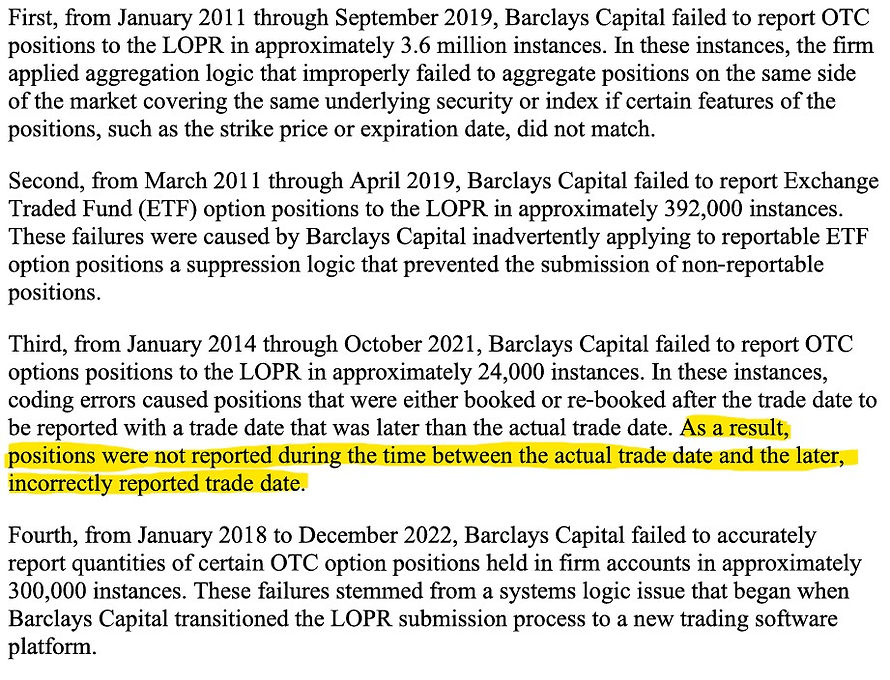charles
FRAUD
Expose Truth.Fight Injustice.Demand Action.


DISSY AWARD HONOREES
Note: The Dissy Awards selection committee has some catching up to do.
The honorees for May-November will be announced no later than Thanksgiving.
April 2025 - MarketAxess
March 2025 - UBS
DISHONORABLE MENTIONS:
DISSY-WORTHY DISCIPLINARY ACTIONS
Barclay's Capital (2023) - "The Crown Jewel" - in terms of relevance to the Charles Fraud files
WellsFargo (2024) - Millions of transactions misreported due to "coding issues"
JP Morgan (2024) - 77 Billions Shares Misreported for Lapses Spanning 16 years!


THE DISTURBING TRUTH ABOUT FINRA DISICPLINARY ACTIONS
The current regulatory regime is largely ineffectual because, among other issues, nobody is paying attention. Effective deterrents require awareness. Sometimes the media will report when a large firm is issued a significant fine by FINRA, typically not much airtime is dedicated - a flash in the pan at best - even when serious wrongdoing is revealed.
Most people are unaware that, even when a "disciplinary action" is taken, what this really means is the financial institution has agreed to is settle the matter "without admitting or denying any wrongdoing." Moreover, they are guaranteed that FINRA will not bring any future actions based on the same factual findings.
Typically, the Letter of Acknowledgement, Waiver, and Consent ("AWC") - the document officially ordaining the disciplinary action - contains the following statements:
-
"Respondent hereby accepts and consents to the following findings by FINRA without admitting or denying them."
-
"This AWC is submitted on the condition that, if accepted, FINRA will not bring any future actions against Respondent alleging violations based on the same factual findings described in this AWC."
Essentially, firms are able to purchase a “get out of jail free” card— usually at fire-sale prices. Often, the issues are "self-reported" by the financial institution and are attributed to benign sounding “coding errors" or “system issues.” These issues often represent vulnerabilities that could be exploited for fraudulent and/or manipulative purposes, but there is rarely any serious inquiry into whether the systematic errors impacted more than just regulatory reporting (i.e. corresponding to errors in clients' transaction data and cash accounting). FINRA acknowledges that inaccurate reporting prevents detection of fraudulent, manipulative, and abusive activities by market participants.
For example, as pertains to the Trade Reporting and Compliance Engine (TRACE), FINRA states that:
"Inaccurate information affects the audit trail and can result in either false alerts or the inability to detect problematic transactions." FINRA MarketAxess A.W.C. NO. 2020065254901 - page 2.
And as concerns Blue Sheets:
"Incomplete, inaccurate and untimely Blue Sheet data compromises regulators’ ability to identify individuals engaging in insider trading schemes and other fraudulent activity." Electronic Blue Sheets (EBS) | FINRA.org
A few subtly mismatched dates, transaction details, or missing account identifiers, even a million times over, is nevertheless preferable than leaving behind an actual paper trail that allows regulators to uncover elaborate schemes that exploit these "coding errors," which of course leads to the question as to whether these are really even errors after all.
Seemingly minor infractions can be far more significant than they seem. Exposing this is the core of the Charles Fraud mission: I have the proof—erroneous timekeeping, coding errors, incorrect account identifiers, and much more.

DISHONORABLE MENTIONS:
DISSY-WORTHY DISCIPLINARY ACTIONS
The Crown Jewel of Disciplinary Actions as pertains to Charles Fraud belongs to Barclay's Capital. The timing precisely matches, so does the type of error - options positions that were not reported due to subtle errors regarding the Inaccurate Transaction Dates. Barclays admissions are critical for establishing, as a result of the precise types of I identified errors in my Schwab account records, positions were missing from the record.
But it's also important not to lose sight of the literally millions of additional instances of OTC options that failed to be reported to the Large Options Positions Reporting (LOPR) - over the course of 11 years before they were "self-reported." According to FINRA: "The accuracy of LOPR reporting is essential to FINRA's surveillance. It is particularly important with respect to the OTC options market because there is no independent data source for regulators to review OTC options." Barclays A.W.C. 2019061076001 - p.2.
So, for 11 years, Barclays failed to report transactions to the only system that regulators have to review OTC options. Is a $3 Million fine (less than $1 per "instance") enough to make sure that "systems logic issue(s)" and "coding errors" like this don't occur again? Did Barclays or other market participants benefit from these lapses? Did retail investors suffer damages?
The nature and timing of the errors, and the types of transactions involved, render it plausible that Barclays Capital was the counterparty to transactions that were misreported in my Schwab Account. The problem is, Schwab refuses to address the matter with integrity, they refuse to admit any errors even exist. And, Barclays is exempt from any further disciplinary action regarding these factual findings:

THE CROWN JEWEL OF FINRA DISCIPLINARY ACTIONS
(especially relevant to the Charles Fraud case)
BARCLAYS CAPITAL, INC.


Wells Fargo Clearing Services
Transaction information "misreported" for 5.5 million Transactions
including: transaction time, taxpayer identification indicators, and the exchange where trades were executed
Noticeably missing from FINRA's disciplinary actions are details regarding the true significance of the errors that caused the regulatory lapses.
For instance, how do "software coding issues" just happen to misreport all of this data:
"the exchanges where additional trades were executed (other than those the firm previously disclosed earlier); the taxpayer identification indicators for a certain account; average price indicators; the order execution time of certain dividend reinvestments;
buy/sell codes for certain options transactions; and state and/or zip code information."
This "error" caused 22,000 Blue Sheet Submissions to be submitted "containing inaccurate information about approximately 5.5 Million transactions" between 2011-2013, and they were assessed a $900,000 fine - in 2024, over a decade later. Were there other inaccuracies in theirs or their clients bookkeeping that occurred as a result of these errors? If anyone even actually checked...we'll never know because this is now a settled matter.
From Wells Fargo Clearing Services AWC NO. 2019062573101 - p.2:

JP Morgan Securities
77 Billions Shares Misreported for Lapses Spanning 16 years!
How can it be that millions of transactions are be misreported over the course of years before anybody notices? How about 77 Billion shares being misreported?
JP Morgan's lapse is particularly notable, misreporting involving 880,000 positions - 77 Billion Shares - across 390 bi-monthly billing cycles - from 2008 to 2024 - apparently because the firm "did not have a process in place to periodically review whether accounts were properly included or excluded for purposes of short interest reporting." The price tag to make it all go away: $3 Million. For those keeping score, that works out to a $1 fine for every 25,000 misreported shares. How does this effective deter reckless disregard for regulatory reporting requirements? J.P. Morgan Securities LLC NO. 2020065501201 - p.3.

.jpg)

